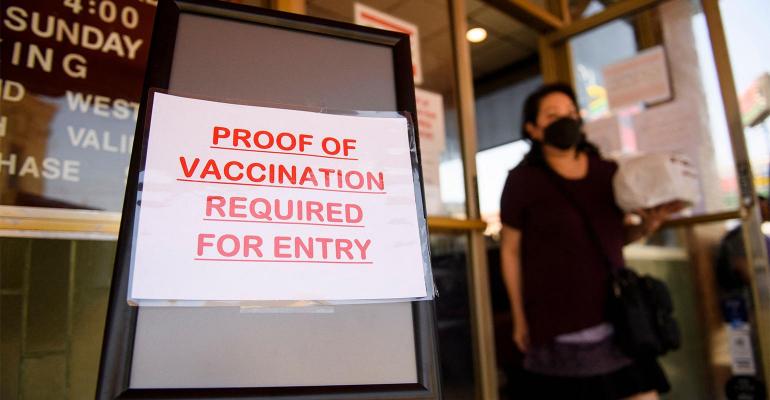As COVID-19 delta variant cases continue to surge, local governments are making tough decisions on putting restrictions back in place to quell the rising tide, including vaccination mandates.
Currently, New York City, San Francisco, New Orleans, and most recently ‑- Honolulu, and Berkeley, Calif. have passed variations on proof of vaccination mandates for indoor dining, gyms, concerts, sporting events and more. Right now, only New Orleans and San Francisco’s proof of vaccination (or negative COVID test) mandates have gone into effect, but the others are soon to follow this month (Honolulu and New York City on Sept. 13) or next month (Berkeley on Oct. 15).
While San Francisco restaurants have been adjusting to this new COVID-19 restriction for two weeks, individual restaurant operators in other parts of the country have made the decision to strike out on their own and put vaccine proof requirements in place on their own without local ordinances requiring them to do so.
Whether following local COVID-19 regulations or making the decision to require vaccination proof on their own, adjusting to this next stage of the pandemic is challenging but helps the restaurant industry – and their customers – breathe a sigh of relief.
“We initially got a bunch of highly negatively charged responses like ‘take me off your mailing list, how dare you tell me what to do with my body, etc.’” Pete Sittnick, managing partner of Waterbar and Epic Steak in San Francisco said. “But I’d rather have these reactions online ahead of time than dealing with them coming in. […] Overall, people were really happy we were doing this and prepared to show their card.”
Sittnick said that they were prepared with signage provided by the City of San Francisco that uniformly alerts customers to the vaccine card requirement. Overall, the reactions have been quiet and Sittnick has not had to turn away a single customer, though he did note that there has been an uptick in requests for outdoor dining over the past two weeks.
“It’s easy to make the city the bad guy in this situation,” Sittnick said. “[If I had trouble] I would just tell them, ‘Sorry, you can’t be a guest here but the next place down the street will have the same reaction.’”
Even though it might be a little bit easier to enforce a citywide mandate, the adjustment still comes some operational challenges. Akash Kapoor, CEO of the Bay Area-based Curry Up Now fast-casual Indian chain said that for his San Francisco location, they had to move employees around to allow for someone to act as a vaccine identification checker at the door. This has been an especially challenging adjustment given the labor challenges the restaurant industry has faced.
“It’s a big headache,” Kapoor said, though he does approve of the proof of vaccine mandate. “But if it makes the whole world safer, why not? The sooner we can get rid of this thing, the better.”
Kapoor said that he has already had managers from his other stores request signage to put in their own restaurants to mandate vaccination proof on their own. He said that as for pushback from customers, he had more of a negative reaction to mask mandates than showing vaccine cards.
“It’s simply an operational hinderance, but you do what you can to make it happen,” he said.
Generally, the Golden Gate Restaurant Association has reported that their restaurant operator members have not had much conflict, and that the key has been open and consistent communication. The operators with the most logistical issues are food courts and hotels or other mixed used spaces, where customers have to flash their vaccination card in one part of the building but not another.
“Overall, we all feel a lot safer,” Lauren Thomas, restaurant operator and executive director of the Golden Gate Restaurant Association said. “I think this is going to make it a much safer city.”
But what about restaurant operators that are choosing to put vaccination proof requirements in place without a citywide mandate to back them up? Hark Café in Minneapolis, Minn. announced on Aug. 19 that they would be requiring proof of vaccination or a negative COVID-19 test within 48 hours of dining at the restaurant starting Aug. 24. Surprisingly, the response from their regular guests was positive, despite the fact that much of the rest of Minneapolis is not requiring this step.
“We have received our fair share of negative Yelp, Google, and Facebook reviews, as well as messages, emails and phone calls--almost entirely from people who do not live in Minneapolis and have never been customers of the café,” co-owner Katherine Purdue said.
They made sure to be very clear in their communication: their vaccination requirements pop up on the homepage of the Hark Café website, they made announcements over social media, and have very clear signage in the store. Employees were also trained in how to deal with pushback and keep it positive. As a result of their bold move, they’ve even made some new customers and are busier than ever.
“Restaurant owners, just like all other small businesses, have a lot to navigate, […] if you live in a place with no mandate, then that decision is yours to make,” Purdue said. “For us, it felt like the best way we could keep in-person dining going. We looked at what our peers in other cities were doing and it made sense to us.”
Contact Joanna at [email protected]
Find her on Twitter: @JoannaFantozzi





